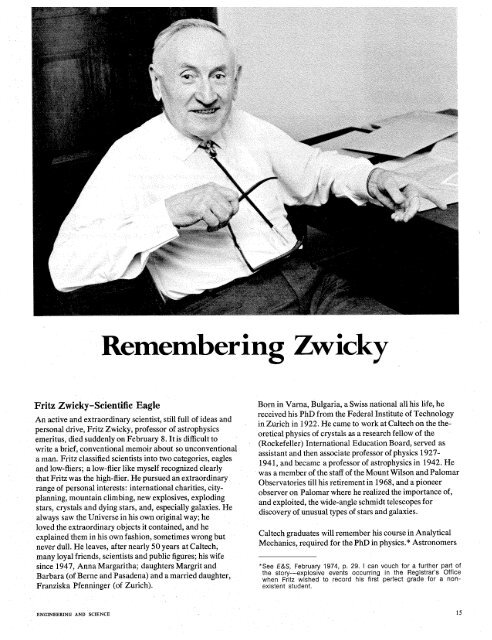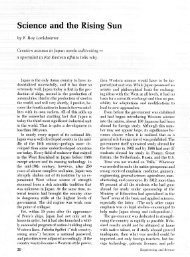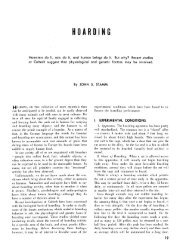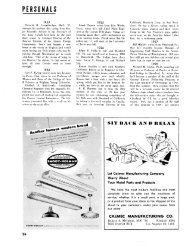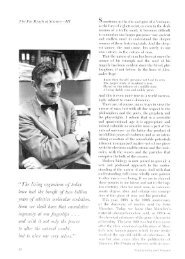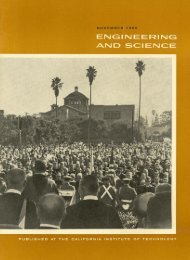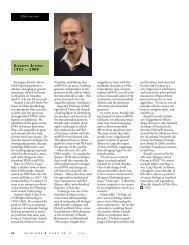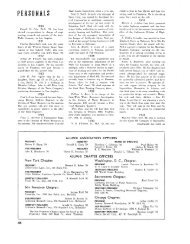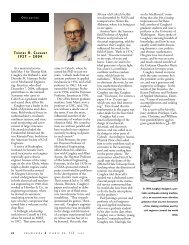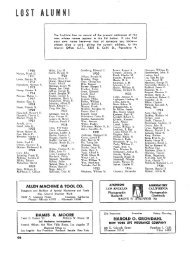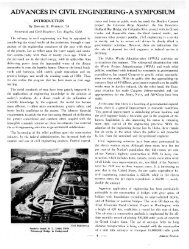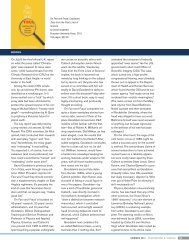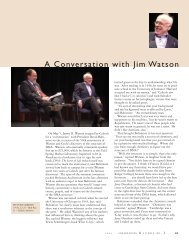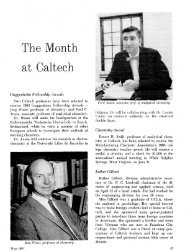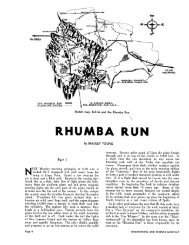Remembering Zwicky - Engineering & Science - Caltech
Remembering Zwicky - Engineering & Science - Caltech
Remembering Zwicky - Engineering & Science - Caltech
Create successful ePaper yourself
Turn your PDF publications into a flip-book with our unique Google optimized e-Paper software.
Fritz <strong>Zwicky</strong>-Scientific Eagle<br />
<strong>Remembering</strong> <strong>Zwicky</strong><br />
An active and extraordinary scientist, still full of ideas and<br />
personal drive, Fritz <strong>Zwicky</strong>, professor of astrophysics<br />
emeritus, died suddenly on February 8. It is difficult to<br />
write a brief, conventional memoir about so unconventional<br />
a man. Fritz classified scientists into two categories, eagles<br />
and low-fliers; a low-flier like myself recognized clearly<br />
that Fritz was the high-flier. He pursued an extraordinary<br />
range of personal interests: international charities, city-<br />
planning, mountain climbing, new explosives, exploding<br />
stars, crystals and dying stars, and, especially galaxies. He<br />
always saw the Universe in his own original way; he<br />
loved the extraordinary objects it contained, and he<br />
explained them in his own fashion, sometimes wrong but<br />
never dull. He leaves, after nearly 50 years at <strong>Caltech</strong>,<br />
many loyal friends, scientists and public figures; his wife<br />
since 1947, Anna Margaritha; daughters Margrit and<br />
Barbara (of Berne and Pasadena) and a married daughter,<br />
Franziska Pfenninger (of Zurich).<br />
ENGINEERING AND SCIENCE<br />
Born in Varna, Bulgaria, a Swiss national all his life, he<br />
received his PhD from the Federal Institute of Technology<br />
in Zurich in 1922. He came to work at <strong>Caltech</strong> on the the-<br />
oretical physics of crystals as a research fellow of the<br />
(Rockefeller) International Education Board, served as<br />
assistant and then associate professor of physics 1927-<br />
1941, and became aprofessor of astrophysics in 1942. He<br />
was a member of the staff of the Mount Wilson and Palomar<br />
Observatories till his retirement in 1968, and a pioneer<br />
observer on Palomar where he realized the importance of,<br />
and exploited, the wide-angle schmidt telescopes for<br />
discovery of unusual types of stars and galaxies.<br />
<strong>Caltech</strong> graduates will remember his course in Analytical<br />
Mechanics, required for the PhD in physics." Astronomers<br />
*See E&S, February 1974, p. 29. 1 can vouch for a further part of<br />
the story-explosive events occurring in the Registrar's Office<br />
when Fritz wished to record his first perfect grade for a non-<br />
existent student.
He climbed many scientific mountains,<br />
some with great success, many<br />
for the first time<br />
will remember his advanced seminar, which covered the<br />
Universe and admitted "only students, assistants, faculty<br />
and visiting research personnel. . . who have the time,<br />
inclination and ability to engage in active, constructive<br />
work. . . . " Faculty wives and secretaries will remember<br />
his charitable activities, including an annual display in our<br />
board room of children's knitwear destined for schools for<br />
war-orphaned children. Although <strong>Zwicky</strong> had few formal<br />
students in later years, he retained a strong influence on<br />
recent scientific developments.<br />
He became one of the founders (with Theodore von<br />
Karman, Clark Millikan, and others) of Aerojet Engineer-<br />
ing, where he served as director of research 1943-49; he<br />
was research consultant at Aerojet-General and Hycon till<br />
1960. He held many patents on unusual concepts and<br />
devices in jet propulsion-air, water, and earth-borne.<br />
When he visited Japan and Germany for the U.S. Air Force,<br />
his strong interest in human causes led him to individual<br />
acts of charity long remembered. He had a strong interest<br />
in the Pestalozzi Foundation, was trustee and president of<br />
the American branch, and received its gold medal in 1955.<br />
He organized a lengthy project for reconstruction of war-<br />
stricken libraries; for years I struggled with <strong>Zwicky</strong> (always<br />
an adrninistrator-baiter) to remove the many tons of books<br />
on their way to the Orient or Europe. For many technical<br />
services, and for his good works, he received the Medal<br />
for Freedom in 1949 from President Truman.<br />
He was awarded the Gold Medal of the Royal Astronomical<br />
Society in 1973 for "his many distinguished contributions<br />
to the understanding of the constituents of the Galaxy<br />
and the Universe." The medal carries the motto Quicquid<br />
Nitet Notandurn [Whatever shines is to be noticed], a<br />
phrase peculiarly suited to <strong>Zwicky</strong>'s approach to<br />
astronomy. <strong>Zwicky</strong>'s response was equally apt-"I heard<br />
as a boy that there will always be an England, a place<br />
where debatable gentlemen will be recognized. I hope you<br />
have not made a mistake this time."<br />
<strong>Zwicky</strong> wrote over 300 articles, 10 books, and held 25<br />
patents. From 1933 on he had a philosophical interest in<br />
morphological research, a systematic approach to science<br />
and technology; he was founder and president of the Society<br />
for Morphological Research, and recently a <strong>Zwicky</strong><br />
Foundation was established in Glarus. He had a strong<br />
classical background in thermodynamics and statistical<br />
16<br />
physics. These two threads, combined with a strong<br />
personality and bold mind, led him to contribute to astro-<br />
physics in a unique way. Lacking the repressions of many,<br />
he felt that if a "morphological box"-i.e., a possibility-<br />
existed, nature would have filled it and scientists should<br />
discover it. This characteristic pattern is found in many of<br />
his fields of study.<br />
From 192 1 to 1937 he studied secondary structure in<br />
crystals, cooperative phenomena, and the theory of cosmic<br />
rays; by 1928 he was interested in, and doubtful about,<br />
relativity; in 1934 he cooperated with Walter Baade of<br />
the Mount Wilson Observatory staff in the discovery of<br />
supernovae. He attempted to explain them as a collapse to<br />
the neutron-star state (1 934), and as producing cosmic<br />
rays (1934). Both the discovery of the supernovae and the<br />
theoretical links to neutron stars (only two years after the<br />
neutron was discovered) are extraordinary feats. A super-<br />
nova explosion releases energy close to what the sun radiates<br />
in 10'' years! Neutron-star physics was, in fact, put on a<br />
sound theoretical basis by 1937 by Oppenheimer and<br />
Volkoff. And rotating neutron stars probably do accelerate<br />
cosmic rays; the Baade-<strong>Zwicky</strong> mechanism used dectro-<br />
static fields. With many collaborators, <strong>Zwicky</strong> started a<br />
supernova patrol which discovered most of those now<br />
known, finding 100 himself. Baade and Rudolph<br />
Minkowski explored and classified their spectra, still an<br />
active topic of study and debate. <strong>Zwicky</strong> carried the idea<br />
of collapse under gravity much further, contemplating<br />
"pygmy stars7' (which do not exist) and "object Hades"<br />
(black holes, which probably do exist). Several threads<br />
of his work thus appear-interest in extreme types of<br />
objects; speculative, approximate theory based largely on<br />
classical models; and willingness to undertake systematic,<br />
very large, and long observing programs.<br />
In studies of galaxies, which he began in 1929 with a note<br />
on the possibility d a gravitational drag on light, <strong>Zwicky</strong><br />
combined a serious devotion to discovery and cataloging<br />
their properties with criticism of the expanding universe<br />
theory. He was constructively concerned about the<br />
applicability of the conventional definition of a galaxy as a<br />
large, closed system of a hundred billion stars-why not<br />
a billion or a million or ten stars? Why should not very<br />
dense galaxies exist? Could they be found? Look with the<br />
schrnidt telescope! He studied interacting galaxies of<br />
strange shape, the forms of clusters of galaxies, searched for<br />
MARCH-APRIL. 1974
intergalactic matter and intergalactic stars.<br />
One important result was the six-volume catalog of<br />
galaxies and clusters of galaxies, prepared with collabora-<br />
tors, which will be of permanent importance to extra-<br />
galactic astronomy. The "compact"-i.e., relatively dense,<br />
high-surface brightness-galaxies have become of special<br />
importance with the discovery by Sandage, Schmidt, and<br />
others d the quasars, and of their large redshift; <strong>Zwicky</strong><br />
made lists of compact galaxies, published a large, useful<br />
catalog, and had another in preparation.<br />
Violent events in the nuclei of galaxies (which may vary in<br />
light in a few days) and explosive phenomena in Seyfert<br />
nuclei have been a major concern of astronomers and<br />
observers of the last decade. The trend of recent studies of<br />
galactic nuclei has been to reinforce our knowledge of<br />
high-energy events of still mysterious nature. It is clear<br />
that <strong>Zwicky</strong>'s intuition of the importance of implosion-<br />
explosion events was a valuable one. In a sense he was a<br />
pioneer of high-energy astrophysics. The strange shapes of<br />
interacting galaxies interested <strong>Zwicky</strong> in his search for<br />
intergalactic matter. Here, the recent discovery of X-rays<br />
from clusters of galaxies suggests that he had an early<br />
insight into still another important field.<br />
With Milton Humason, he found the first "faint blue stars,"<br />
48 hot objects far from the galactic plane-objects on<br />
which I have worked, with pleasure, for many years.<br />
Closer to home, <strong>Zwicky</strong> was interested in research in space<br />
by 1946; he attempted to launch arti6cial meteors from a<br />
rocket, and claimed to have shot the first object out of the<br />
gravitational field of the earth; he helped found the<br />
International Academy of Astronautics and lectured on<br />
legal problems of the use of space.<br />
<strong>Zwicky</strong>, as a young man, was a good mountain climber.<br />
&e was an extraordinarily live person. He climbed many<br />
scientific mountains, some with great success, many for<br />
the first time.<br />
ENGINEERING AND SCIENCE<br />
-Jesse L. Greenstein<br />
Lee A. DuBridge Professor oj Astr~physics<br />
<strong>Zwicky</strong> : Humanist<br />
and Philosopher<br />
The great majority of Fritz <strong>Zwicky</strong>'s publications were<br />
in the field of astronomy. Most of the remainder were<br />
about his researches in solid state physics and jet<br />
propulsion technology. But <strong>Zwicky</strong> himself always felt<br />
that his greatest contributions were in philosophy,<br />
specifically in epistemology-in the development of new<br />
methods of thought and action. He wrote in 1971 : "I feel<br />
that I have finally found the philosopher's stone in what<br />
I call the morphological outlook and method."<br />
Giving us an insight into how he came to feel this way,<br />
<strong>Zwicky</strong> said in addressing the Pestalozzi Foundation of<br />
America, of which he served as president of the board<br />
of trustees: "After pursuing a dozen or so various<br />
activities ranging from mountain climbing and pro-<br />
fessional shorthand to physics, astronomy, engineering,<br />
languages, higher education, national and international<br />
politics, and mutual aid with fair success, I still did not<br />
feel satisfied. . . . It was difficult to account for the lack<br />
of satisfaction until it occurred to me . . . that no stereo-<br />
type activity in the books of the past corresponds to my<br />
personal genius. Its nature is such that it could become<br />
fully alive only through the creation of a new profession-<br />
the morphologist."<br />
This is not the occasion to review the details of the<br />
morphological method. Suffice it to say that the morpho-<br />
logical approach sought to be integrative, systematic, and<br />
trans-scientific, pushing consciousness to the limits of the<br />
conceivable. <strong>Zwicky</strong> believed that if only we could free<br />
ourselves from our pedestrian patterns of thought and<br />
learn to think morphologically, the future could be shaped<br />
by our images-however bold-rather than by the<br />
inertias of existing institutions and investments. For<br />
<strong>Zwicky</strong>, the really revolutionary paradigm of morphology<br />
consisted in the replacement of one solution by all<br />
solutions, one path by all paths, one system by all systems.<br />
Only after the complete spectrum of possible solutions,<br />
theories, or systems is developed can the full energies of<br />
their mutual tensions become available to us.<br />
<strong>Zwicky</strong>7s "method of morphological construction" passed<br />
William James's test for great innovative ideas: "First<br />
the new idea is mocked as ridiculous and absurd, then it
is admitted to be valid but overrated and of no particular<br />
significance, finally it is decided that the idea had been<br />
known long ago and that everybody had thought of it<br />
himself." So it was with morphology.<br />
<strong>Zwicky</strong> possessed that necessary concomitant of great-<br />
ness, the generation in others of a strong positive or<br />
negative response. Very few people were merely indiffer-<br />
ent to him. His evocation of bi-modal responses was in<br />
part due to his phenomenal percipience. Those who see<br />
further or deeper are not universally admired.<br />
Another cause was <strong>Zwicky</strong>'s frequent distrust of those in<br />
the upper echelons: "Unfortunately many people, and in<br />
particular professional men, are impressed only by specific<br />
accomplishments in science, engineering, hance, politics<br />
and so on, which lead to fame or to material and spiritual<br />
'success' of one kind or another. Such men are a great<br />
obstacle to humanity in its march toward the realization<br />
of its inherent genius."<br />
<strong>Zwicky</strong> felt that it was important to unhorse the pompous.<br />
He felt that all professors and executives should stay in<br />
touch with reality by periodically cleaning the wash rooms.<br />
He set the example by doing this himself. It would please<br />
<strong>Zwicky</strong> to say that "that bastard Chairman Mao" stole<br />
this aspect of the cultural revolution from him.<br />
One of <strong>Zwicky</strong>'s humanitarian activities was his organi-<br />
zation of the Committee for Aid to War-Stricken Scientific<br />
Libraries. In order to establish closer scientific human<br />
relations, together with a small handful of volunteer<br />
assistants, <strong>Zwicky</strong> collected and distributed over a million<br />
dollars worth of scientific periodicals and books, sending<br />
them to university and other libraries that had been<br />
destroyed in the war-first to allied countries, later to<br />
former enemy countries. <strong>Zwicky</strong> devoted his weekends for<br />
several years to this task, personally carrying the heavy<br />
cartons of journals, cataloging, wrapping, and mailing.<br />
But <strong>Zwicky</strong> had a second purpose in mind in organizing<br />
the Library Aid Committee. He said, "A common suppo-<br />
sition is that activities d this kind require for their<br />
successful realization large organizations and considerable<br />
funds." <strong>Zwicky</strong> wanted to disprove this. He felt that the<br />
revitalization of democracy depended on "more initiative<br />
on the part of every individual as such." The book project<br />
was completed "without recourse to any funds except for ,<br />
a few dollars for wrapping paper, a card index, and some<br />
expenses for driving a car for the purposes of collecting<br />
the material."<br />
<strong>Zwicky</strong>'s point was that there are enough men and women<br />
of good will to make such projects a success if only they<br />
are pushed with determination. Availability of funds is<br />
not a prerequisite. He felt that such projects as the book<br />
distribution do more for establishing ties of confidence<br />
between different nations and races than can be achieved<br />
by speechmaking, legislation, or high-sounding efforts at<br />
international cooperation.<br />
<strong>Zwicky</strong> was concerned with a second type of energy crisis,<br />
the drying up of spiritual energy: "There exists today no<br />
subject which would excite the imagination of men in a<br />
positive way, stimulating a constructive and happy life.<br />
The universal appeals of religion, art, political freedom,<br />
and science have faded to the vanishing point."<br />
<strong>Zwicky</strong>'s perception of the collapse of imaging power and<br />
its import for the Western World came two decades before<br />
other futurists finally woke up to its significance. In 1946,<br />
he wrote: "The world of today is in a state of disorder<br />
which is in conspicuous contrast to the avowed purposes<br />
of man . . . the teachings of science, of education, and of<br />
religion seem to have become lost in an elaborate system<br />
of hypocrisy in which there is little relation between words<br />
and actions."<br />
This was one of the earliest recognitions of the corruption<br />
of our culture through the distortion of language.<br />
If a single theme dominates <strong>Zwicky</strong>'s humanistic writings,<br />
it is the importance of unfettered individual creativity<br />
and effort. This viewpoint may not be shared by those who<br />
feel everything worthwhile that remains to be discovered<br />
or developed will require sizable federal appropriations.<br />
<strong>Zwicky</strong> briefly went the grant and contract route but<br />
decided that the loss of the essence of creativity that was<br />
implicit in the federal funding system precluded its ever<br />
leading to any really basic discoveries. He returned to his<br />
original premise: The world's hopes lie in individual free<br />
agents, men and women of goqd will who can come<br />
together and work when the need be, but who form no<br />
permanent organizations or institutions.
One might wonder why a person of <strong>Zwicky</strong>'s creative<br />
stature never attracted large numbers of followers.<br />
Discipleship was inconsistent with <strong>Zwicky</strong>'s basic views.<br />
He held that everyone was a genius and that each<br />
person's life task was to find his own genius, not to follow<br />
some other genius. "Most individuals just never seem to<br />
realize that they possess unique potentialities and<br />
capabilities not to be matched by anybody else and that<br />
the penalty for not realizing one's genius is frustration<br />
and unhappiness."<br />
Our present civilization is built on, and for, only a few<br />
types of geniuses. This is why so many are frustrated and<br />
unhappy. This malignancy will remain at the core of<br />
society until some way is found of restructuring so as to<br />
allow each person to discover his own innate genius.<br />
Whether <strong>Zwicky</strong>'s genius was to hear the beat of different<br />
drummers or whether it was the acuity to hear the<br />
fainter drummings of the same cosmic drummer that we<br />
all hear in part, his passing removes from our midst a<br />
creative source of great originality. With his departure<br />
the world becomes more homogenized and more mediocre;<br />
humankind loses a portion of its freedom and its dignity.<br />
All who knew <strong>Zwicky</strong> would agree in the appropriateness<br />
of applying to him that eloquent eulogy first uttered by<br />
Winston Churchill on learning of the death of Rupert<br />
Brooke, which was later used at Churchill's own funeral:<br />
Certainly, we shall not see his like again, and<br />
these are times when this world has a desperate need<br />
for <strong>Zwicky</strong>'s particular type of genius.<br />
-Albert G. Wilson<br />
Director<br />
Sociely for Morphological Research<br />
ENGINEERING AND SCIENCE<br />
<strong>Zwicky</strong> on <strong>Zwicky</strong><br />
Theodore von Karmun was not only a brilliant scientist;<br />
he UMS also a man who knew his <strong>Zwicky</strong>, as indicated in<br />
this brief excerpt from a 1971 interview with <strong>Zwicky</strong> by<br />
R. Cargill Hall, historian at the Jet Propulsion Laboratory.<br />
I think I was instrumental in talking Millikan into<br />
getting Von Karman here permanently in 193 1-32 or so,<br />
and we were really old friends. In all my attempts to get<br />
physics over into astronomy, engineering over into astron-<br />
omy, and so on, he supported me heavily. While he was<br />
Director of the Scientific Advisory Board on the Air Force<br />
(on my standing with my colleagues I would have never been<br />
on that), he insisted that I too should be on it. So, he pushed<br />
that through, and I am indebted to him for that, and also<br />
later on for having pushed me into the International<br />
Academy of Astronautics, and so on. And it would have<br />
been quite impossible if all the hierarchy in power would<br />
have had their say, because they can not really admit a<br />
non-conformist like myself. On the other hand, he had his<br />
little jokes with me. He thought I was treating people too<br />
abruptly, too roughly, and it would be better not to be that<br />
rough; but to commemorate this abrasiveness, he said,<br />
"Now we have an occasion to get you into history, and we<br />
must devise a unit for the roughness of airplane wings,<br />
the surfaces of missiles, and so on. The proper thing will<br />
be to name this unit a <strong>Zwicky</strong>." But then on second<br />
thought, he said, "There is no such thing as a whole <strong>Zwicky</strong><br />
except you-that's far too excessiveso the practical unit<br />
will be a micro-<strong>Zwicky</strong>!"


